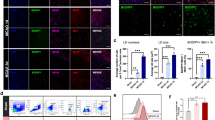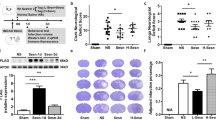Abstract
It is known that cerebral ischemia can cause brain inflammation and adiposome can serve as a depot of inflammatory mediators. In the study, the pro-inflammatory and pro-death role of adiposome in ischemic microglia and ischemic brain was newly investigated. The contribution of PPARγ to adiposome formation was also evaluated for the first time in ischemic microglia. Focal cerebral ischemia/reperfusion (I/R) animal model and the in vitro glucose-oxygen-serum deprivation (GOSD) cell model were both applied in the study. GOSD- or I/R-induced adiposome formation, inflammatory activity, cell death of microglia, and brain infarction were, respectively, determined, in the absence or presence of NS-398 (adiposome inhibitor) or GW9662 (PPARγ antagonist). GOSD-increased adiposome formation played a critical role in stimulating the inflammatory activity (production of TNF-α and IL-1β) and cell death of microglia. Similar results were also found in ischemic brain tissues. GOSD-induced PPARγ partially contributed to the increase of adiposomes and adiposome-mediated inflammatory responses of microglia. Blockade of adiposome formation with NS-398 or GW9662 significantly reduced not only the inflammatory activity and death rate of GOSD-treated microglia but also the brain infarct volume and motor function deficit of ischemic rats. The pathological role of microglia-derived adiposome in cerebral ischemia has been confirmed and attributed to its pro-inflammatory and/or pro-death effect upon ischemic brain cells and tissues. Adiposome and its upstream regulator PPARγ were therefore as potential targets for the treatment of ischemic stroke. Therapeutic values of NS-398 and GW9662 have been suggested.






Similar content being viewed by others
References
Andersson L, Bostrom P, Ericson J, Rutberg M, Magnusson B, Marchesan D, Ruiz M, Asp L, Huang P, Frohman MA, Boren J, Olofsson SO (2006) PLD1 and ERK2 regulate cytosolic lipid droplet formation. J Cell Sci 119(Pt 11):2246–2257. https://doi.org/10.1242/jcs.02941
Assumpcao JAF, Magalhaes KG, Correa JR (2017) The role of ppargamma and autophagy in ros production, lipid droplets biogenesis and its involvement with colorectal cancer cells modulation. Cancer Cell Int 17:82. https://doi.org/10.1186/s12935-017-0451-5
Bandeira-Melo C, Phoofolo M, Weller PF (2001) Extranuclear lipid bodies, elicited by CCR3-mediated signaling pathways, are the sites of chemokine-enhanced leukotriene C4 production in eosinophils and basophils. J Biol Chem 276(25):22779–22787. https://doi.org/10.1074/jbc.M101436200
Beil WJ, Weller PF, Peppercorn MA, Galli SJ, Dvorak AM (1995) Ultrastructural immunogold localization of subcellular sites of TNF-alpha in colonic Crohn’s disease. J Leukoc Biol 58(3):284–298
Bozza PT, Payne JL, Morham SG, Langenbach R, Smithies O, Weller PF (1996) Leukocyte lipid body formation and eicosanoid generation: cyclooxygenase-independent inhibition by aspirin. Proc Natl Acad Sci USA 93(20):11091–11096
Bozza PT, Pacheco P, Yu W, Weller PF (2002) NS-398: cyclooxygenase-2 independent inhibition of leukocyte priming for lipid body formation and enhanced leukotriene generation. Prostaglandins Leukot Essent Fatty Acids 67(4):237–244
Candelario-Jalil E, Ajamieh HH, Sam S, Martinez G, Leon Fernandez OS (2000) Nimesulide limits kainate-induced oxidative damage in the rat hippocampus. Eur J Pharmacol 390(3):295–298
Defaux A, Zurich MG, Braissant O, Honegger P, Monnet-Tschudi F (2009) Effects of the PPAR-beta agonist GW501516 in an in vitro model of brain inflammation and antibody-induced demyelination. J Neuroinflammation 6:15. https://doi.org/10.1186/1742-2094-6-15
Donnan GA, Fisher M, Macleod M, Davis SM (2008) Stroke Lancet 371(9624):1612–1623. https://doi.org/10.1016/S0140-6736(08)60694-7
Duan SZ, Usher MG, Mortensen RM (2008) Peroxisome proliferator-activated receptor-gamma-mediated effects in the vasculature. Circ Res 102(3):283–294. https://doi.org/10.1161/CIRCRESAHA.107.164384
Ducharme NA, Bickel PE (2008) Lipid droplets in lipogenesis and lipolysis. Endocrinology 149(3):942–949. https://doi.org/10.1210/en.2007-1713
England H, Summersgill HR, Edye ME, Rothwell NJ, Brough D (2014) Release of interleukin-1alpha or interleukin-1beta depends on mechanism of cell death. J Biol Chem 289(23):15942–15950. https://doi.org/10.1074/jbc.M114.557561
Fan B, Ikuyama S, Gu JQ, Wei P, Oyama J, Inoguchi T, Nishimura J (2009) Oleic acid-induced ADRP expression requires both AP-1 and PPAR response elements, and is reduced by Pycnogenol through mRNA degradation in NMuLi liver cells. Am J Physiol Endocrinol Metab 297(1):E112–E123. https://doi.org/10.1152/ajpendo.00119.2009
Fong WH, Tsai HD, Chen YC, Wu JS, Lin TN (2010) Anti-apoptotic actions of PPAR-gamma against ischemic stroke. Mol Neurobiol 41(2–3):180–186. https://doi.org/10.1007/s12035-010-8103-y
Gao S, Ito H, Murakami M, Yoshida K, Tagawa Y, Hagiwara K, Takagi A, Kojima T, Suzuki M, Banno Y, Ohguchi K, Nozawa Y, Murate T (2010) Mechanism of increased PLD1 gene expression during early adipocyte differentiation process of mouse cell line 3T3-L1. J Cell Biochem 109(2):375–382. https://doi.org/10.1002/jcb.22414
Gasparovic C, Rosenberg GA, Wallace JA, Estrada EY, Roberts K, Pastuszyn A, Ahmed W, Graham GD (2001) Magnetic resonance lipid signals in rat brain after experimental stroke correlate with neutral lipid accumulation. Neurosci Lett 301(2):87–90
Goswami S, Sharma-Walia N (2016) Crosstalk between osteoprotegerin (OPG), fatty acid synthase (FASN) and, cycloxygenase-2 (COX-2) in breast cancer: implications in carcinogenesis. Oncotarget 7(37):58953–58974. https://doi.org/10.18632/oncotarget.9835
Harada K, Honmou O, Liu H, Bando M, Houkin K, Kocsis JD (2007) Magnetic resonance lactate and lipid signals in rat brain after middle cerebral artery occlusion model. Brain Res 1134(1):206–213. https://doi.org/10.1016/j.brainres.2006.11.075
Hong C, Tontonoz P (2008) Coordination of inflammation and metabolism by PPAR and LXR nuclear receptors. Curr Opin Genet Dev 18(5):461–467. https://doi.org/10.1016/j.gde.2008.07.016
Hu X, Xu B, Ge W (2017) The Role of Lipid Bodies in the Microglial Aging Process and Related Diseases. Neurochem Res 42(11):3140–3148. https://doi.org/10.1007/s11064-017-2351-4
Hundsberger H, Verin A, Wiesner C, Pfluger M, Dulebo A, Schutt W, Lasters I, Mannel DN, Wendel A, Lucas R (2008) TNF: a moonlighting protein at the interface between cancer and infection. Front Biosci 13:5374–5386
Hung YW (2014) The role of PPARγ-induced adiposome in the regulation of inflammatory activity of non-small cell lung cancers. National Chung Hsing University
Jin R, Yang G, Li G (2010) Inflammatory mechanisms in ischemic stroke: role of inflammatory cells. J Leukoc Biol 87(5):779–789. https://doi.org/10.1189/jlb.1109766
Khatchadourian A, Bourque SD, Richard VR, Titorenko VI, Maysinger D (2012) Dynamics and regulation of lipid droplet formation in lipopolysaccharide (LPS)-stimulated microglia. Biochim Biophys Acta 1821(4):607–617. https://doi.org/10.1016/j.bbalip.2012.01.007
Kim J, Lee YJ, Kim JM, Lee SY, Bae MA, Ahn JH, Han DC, Kwon BM (2016) PPARgamma agonists induce adipocyte differentiation by modulating the expression of Lipin-1, which acts as a PPARgamma phosphatase. Int J Biochem Cell Biol 81(Pt A):57–66. https://doi.org/10.1016/j.biocel.2016.10.018
Kliewer SA, Forman BM, Blumberg B, Ong ES, Borgmeyer U, Mangelsdorf DJ, Umesono K, Evans RM (1994) Differential expression and activation of a family of murine peroxisome proliferator-activated receptors. Proc Natl Acad Sci USA 91(15):7355–7359
Kuroda M, Sakaue H (2017) Adipocyte Death and Chronic Inflammation in Obesity. J Med Invest 64(3.4):193–196. https://doi.org/10.2152/jmi.64.193
Lee GA, Lin CH, Jiang HH, Chao HJ, Wu CL, Hsueh CM (2004) Microglia-derived glial cell line-derived neurotrophic factor could protect Sprague-Dawley rat astrocyte from in vitro ischemia-induced damage. Neurosci Lett 356(2):111–114
Lee JN, Dutta RK, Kim SG, Lim JY, Kim SJ, Choe SK, Yoo KW, Song SR, Park DS, So HS, Park R (2013) Fenofibrate, a peroxisome proliferator-activated receptor alpha ligand, prevents abnormal liver function induced by a fasting-refeeding process. Biochem Biophys Res Commun 442(1–2):22–27. https://doi.org/10.1016/j.bbrc.2013.10.140
Lin CH, Wang CH, Hsu SL, Liao LY, Lin TA, Hsueh CM (2016) Molecular Mechanisms Responsible for Neuron-Derived Conditioned Medium (NCM)-Mediated Protection of Ischemic Brain. PLoS ONE 11(1):e0146692. https://doi.org/10.1371/journal.pone.0146692
Lin J, Liu Q, Zhang H, Huang X, Zhang R, Chen S, Wang X, Yu B, Hou J (2017) C1q/Tumor necrosis factor-related protein-3 protects macrophages against LPS-induced lipid accumulation, inflammation and phenotype transition via PPARgamma and TLR4-mediated pathways. Oncotarget 8(47):82541–82557. https://doi.org/10.18632/oncotarget.19657
Lu YZ, Lin CH, Cheng FC, Hsueh CM (2005) Molecular mechanisms responsible for microglia-derived protection of Sprague-Dawley rat brain cells during in vitro ischemia. Neurosci Lett 373(2):159–164. https://doi.org/10.1016/j.neulet.2004.10.004
Muller G, Jung C, Wied S, Biemer-Daub G, Frick W (2010) Transfer of the glycosylphosphatidylinositol-anchored 5′-nucleotidase CD73 from adiposomes into rat adipocytes stimulates lipid synthesis. Br J Pharmacol 160(4):878–891. https://doi.org/10.1111/j.1476-5381.2010.00724.x
Nagayama M, Niwa K, Nagayama T, Ross ME, Iadecola C (1999) The cyclooxygenase-2 inhibitor NS-398 ameliorates ischemic brain injury in wild-type mice but not in mice with deletion of the inducible nitric oxide synthase gene. J Cereb Blood Flow Metab 19(11):1213–1219. https://doi.org/10.1097/00004647-199911000-00005
Pope BD, Warren CR, Parker KK, Cowan CA (2016) Microenvironmental Control of Adipocyte Fate and Function. Trends Cell Biol 26(10):745–755. https://doi.org/10.1016/j.tcb.2016.05.005
Ramanan S, Kooshki M, Zhao W, Hsu FC, Riddle DR, Robbins ME (2009) The PPARalpha agonist fenofibrate preserves hippocampal neurogenesis and inhibits microglial activation after whole-brain irradiation. Int J Radiat Oncol Biol Phys 75(3):870–877. https://doi.org/10.1016/j.ijrobp.2009.06.059
Sauvant P, Cansell M, Atgie C (2011) Vitamin A and lipid metabolism: relationship between hepatic stellate cells (HSCs) and adipocytes. J Physiol Biochem 67(3):487–496. https://doi.org/10.1007/s13105-011-0101-7
Tureyen K, Kapadia R, Bowen KK, Satriotomo I, Liang J, Feinstein DL, Vemuganti R (2007) Peroxisome proliferator-activated receptor-gamma agonists induce neuroprotection following transient focal ischemia in normotensive, normoglycemic as well as hypertensive and type-2 diabetic rodents. J Neurochem 101(1):41–56. https://doi.org/10.1111/j.1471-4159.2006.04376.x
Wang CH, Lee WJ, Ghanta VK, Wang WT, Cheng SY, Hsueh CM (2009) Molecules involve in the self-protection of neurons against glucose-oxygen-serum deprivation (GOSD)-induced cell damage. Brain Res Bull 79(3–4):169–176. https://doi.org/10.1016/j.brainresbull.2009.02.006
Wu MR, Hou MH, Lin YL, Kuo CF (2012) 2,4,5-TMBA, a natural inhibitor of cyclooxygenase-2, suppresses adipogenesis and promotes lipolysis in 3T3-L1 adipocytes. J Agric Food Chem 60(29):7262–7269. https://doi.org/10.1021/jf302285k
Xing Y, Wang R, Chen D, Mao J, Shi R, Wu Z, Kang J, Tian W, Zhang C (2015) COX2 is involved in hypoxia-induced TNF-alpha expression in osteoblast. Sci Rep 5:10020. https://doi.org/10.1038/srep10020
Xu G, Sztalryd C, Lu X, Tansey JT, Gan J, Dorward H, Kimmel AR, Londos C (2005) Post-translational regulation of adipose differentiation-related protein by the ubiquitin/proteasome pathway. J Biol Chem 280(52):42841–42847. https://doi.org/10.1074/jbc.M506569200
Zoccal KF, Paula-Silva FW, Bitencourt Cda S, Sorgi CA, Bordon Kde C, Arantes EC, Faccioli LH (2015) PPAR-gamma activation by Tityus serrulatus venom regulates lipid body formation and lipid mediator production. Toxicon 93:90–97. https://doi.org/10.1016/j.toxicon.2014.11.226
Acknowledgements
This study was financially supported by Grants MOST103-2320-B-005-001, TCVGH-NCHU1027613, MacKay Memorial Hospital Grant MMH-102-46, and the iEGG and Animal Biotechnology Center from The Feature Areas Research Center Program within the framework of the Higher Education Sprout Project by the Ministry of Education (MOE) in Taiwan.
Author information
Authors and Affiliations
Contributions
CHL analyzed the data and wrote the paper; LYL designed and executed most of the experiments and analyzed the data; YJC performed the experiments in Figs. 4d and 2d; CWT performed the experiments in Figs. 4e and 5d; TYY and SLH supported the work and edited the paper; CMH conceived the project, designed experiments, supervised others, and edited the manuscript.
Corresponding author
Ethics declarations
Conflict of interest
The authors have no financial and non-financial conflicts of interest.
Additional information
Publisher’s Note
Springer Nature remains neutral with regard to jurisdictional claims in published maps and institutional affiliations.
Rights and permissions
About this article
Cite this article
Lin, CH., Liao, LY., Yang, TY. et al. Microglia-Derived Adiposomes are Potential Targets for the Treatment of Ischemic Stroke. Cell Mol Neurobiol 39, 591–604 (2019). https://doi.org/10.1007/s10571-019-00665-9
Received:
Accepted:
Published:
Issue Date:
DOI: https://doi.org/10.1007/s10571-019-00665-9




